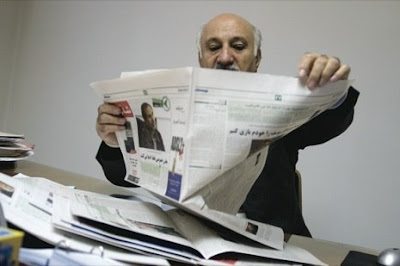
Is Ponting an unworthy successor to Steve Waugh? Or are they really peas from a pod, crude and petty sledgers, with Waugh smelling a little better only because he won more often? My friend Shukles got me thinking about this a couple of days ago, when he suggested that Ponting was no worse than Steve Waugh.
Consider the case for Steve Waugh:
- He found the time to support Udayan, a home for disadvantaged children in Barrackpore, Calcutta
- Waugh found the time to take his team to Gallipoli, to honour the ANZAC soldiers who fell there during WWI, starting off a little tradition
- He taught his team to enjoy playing in India, and more generally the sub-continent. Approaching the tour as a fun experience, rather than as a punishment posting probably had a big part to play in their improved results. One of my favourite photos from Waugh's autobiography is of his team, wearing their lurid yellow uniforms and with their backs to the camera, staring mesmerized at the Taj Mahal
- He encouraged Ed Smith, then a colleague at Kent, to write about what it is like to be a county pro. This is one of my favourite books about contemporary cricket
- He mourned the game's loss when Zimbabwe's Neil Johnson retired after a scintillating World Cup in 1999, including a century against Australia, because he needed to earn a living. He made a plea to the cricket community to support the game in Zimbabwe, because the game was poorer if a player of Johnson's quality could not play. For this, Sunil Gavaskar described Waugh as not just a great player, but a great leader of men. BTW, Gavaskar is no reflexive Aussie supporter.

I couldn't Google-up a link to Waugh's comments about Neil Johnson. It stuck in my memory because of Johnson's amazing personal story. Johnson was a superstar at seventeen, and a has-been at twenty. The South African team management (rightly) preferred Lance Klusener and Shaun Pollock to Neil Johnson for that all-rounder slot. Yet, he hung on to his dream, played for Zimbabwe, and got his revenge on the biggest stage of all when he single-handedly beat a South African team that included Klusener and Pollock in the 1999 World Cup, before riding off into the sunset.
Could a cussed captain have been made to look like a hero by a good spin-doctor? Some moments, like Udayan and Gallipoli, could have been stage managed, though they reflect well on Waugh even if those associations were prompted by an image-consultant. But the Ed Smith and Neil Johnson stories would have been hard for a spin-doctor to fabricate. Looking at the whole rather than at the parts, the gestalt, I still am left with the impression that Waugh was a genuinely gracious guy. He understood that he was a part of something bigger than himself.
If so, why did he sledge? In his autobiography he says "sledging invariably occured when a player was frustrated at his poor form and wanted to show how much he was trying and how much he was annoyed with his performance. It is a cheap way of getting attention...". In Waugh's framework, he did not sledge. He tried to engineer a collapse in his opponent's confidence, mental disintegration, which is a part of the game.
He famously tried to bring about Saurav Ganguly's mental disintegration. Ganguly did not disintegrate, and Waugh now talks about "an ongoing verbal battle between Saurav and me, which belied an underlying admiration for each other... I saw in Saurav a committed individual who wanted to inject some toughness and combativeness into a side that had often tended to roll over and expose a soft underbelly".
In Waugh's world, a captain who tries hard enough is a captain who tries to engineer the mental disintegration of his opponents. Nothing personal or disrespectful. It's just part of the game. Which is why Steve Waugh is such a hard act for Ponting to follow.








